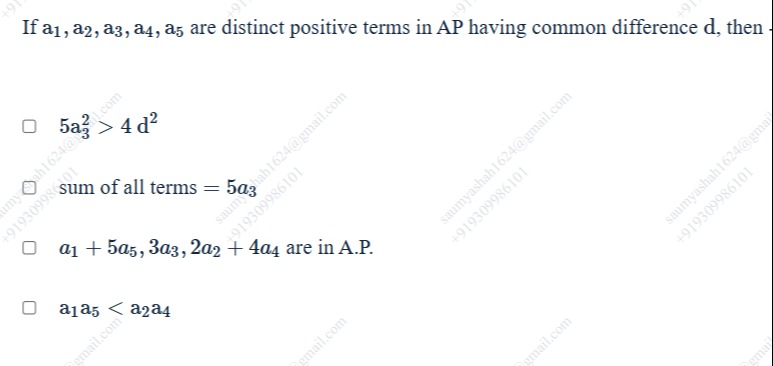Question
Question: If $a_1, a_2, a_3, a_4, a_5$ are distinct positive terms in AP having common difference d, then -...
If a1,a2,a3,a4,a5 are distinct positive terms in AP having common difference d, then -

5a32>4d2
sum of all terms = 5a3
a1+5a5,3a3,2a2+4a4 are in A.P.
a1a5<a2a4
Options 1, 2, and 4 are true.
Solution
Let the terms of the AP be expressed in terms of the middle term a3 and common difference d:
a1a2a3a4a5=a3−2d,=a3−d,=a3,=a3+d,=a3+2d.-
Option 1: 5a32>4d2
a32>4d2/(some constant)
Since all terms are positive and a1=a3−2d>0 (which implies a3>2d) we have:More precisely, reducing gives:
5a32>4d2⟺a32>54d2.Since a3>2d (with d>0) it follows that:
a32>4d2and hence certainly5a32>4d2.Thus, Option 1 is true.
-
Option 2: Sum of all terms = 5a3
S=(a3−2d)+(a3−d)+a3+(a3+d)+(a3+2d)=5a3+(−2d−d+d+2d)=5a3.
Calculate the sum:Hence, Option 2 is true.
-
Option 3: a1+5a5,3a3,2a2+4a4 are in AP
T1T2T3=a1+5a5=(a3−2d)+5(a3+2d)=6a3+8d,=3a3,=2a2+4a4=2(a3−d)+4(a3+d)=6a3+2d.
Evaluate each expression:For these to be in AP, the condition is:
2T2=T1+T3.Substitute:
2(3a3)=6a3andT1+T3=(6a3+8d)+(6a3+2d)=12a3+10d.For equality:
6a3=12a3+10d⟹−6a3=10d,which gives a contradiction because a3 and d are positive.
Thus, Option 3 is false. -
Option 4: a1a5<a2a4
a1a5a2a4=(a3−2d)(a3+2d)=a32−4d2,=(a3−d)(a3+d)=a32−d2.
Compute:Hence,
a1a5<a2a4⟺a32−4d2<a32−d2⟺−4d2<−d2⟺4d2>d2,which is true for d=0.
Thus, Option 4 is true.
